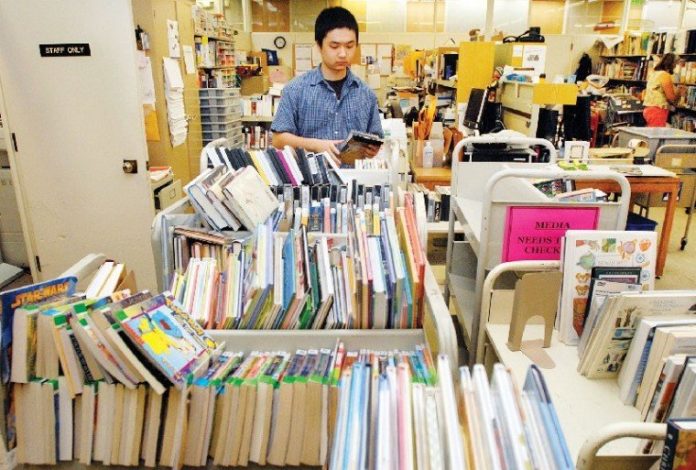City officials and library lovers plan to survey residents to
see if they’ll support an estimated $30 million bond initiative for
a new library. But some fiscal conservatives say any bond measure
would be an unfair tax on property owners, especially those with
home access to the Internet, which has replaced library patronage
to a degree.
Gilroy – City officials and library lovers plan to survey residents to see if they’ll support an estimated $30 million bond initiative for a new library. But some fiscal conservatives say any bond measure would be an unfair tax on property owners, especially those with home access to the Internet, which has replaced library patronage to a degree.
No amount of technology can replace a library, though, according to Councilman Dion Bracco. As Gilroy’s representative on the Santa Clara County Library Joint Powers Authority, which effectively runs the local Santa Clara County library, Bracco joined about 45 people Wednesday night to come up with the grassroots survey idea to promote the replacement of the city’s over-crowded and antiquated facility.
Other financial priorities for the city include the estimated $25 million arts center, which is on hold, and the proposed purchase of Gilroy Gardens for anywhere from $13 million to $25 million.
But this doesn’t deter Lani Yoshimura, Gilroy’s eighth librarian since 1907 who said she felt a sense of refreshed confidence after Wednesday’s meeting.
“The community’s ready to go forward with library,” she said. “For me it was a heart-warming experience.”
This, of course, depends on residents’ willingness to foot the bill because the bond would tax property owners.
Folks on the Gilroy Library Commission and the Library Expansion Committee say they have realized the state’s library renovation coffers are empty, so now they’ll get the word out and fight bond opponents such as Mark Zappa, a conservative activist who questioned the propriety of a new library in an increasingly digital age.
“Of course libraries are important, but a lot of people using the library will not be paying the bond fee, so it seems it’s not a fair way to finance the project,” said Zappa, who sits on the Bond Oversight Committee at Gavilan College. “This is what politicians do because they’re cowards, and they don’t want to pay for projects … They should try being fiscally conservative.”
On the other side of the aisle are people such as retiree Carol DeSantis, who attended Wednesday’s meeting. She said apartment renters, who Zappa said won’t have to pay the bond, will finance the expansion through their rent payments.
“That’s like saying we really don’t need a post office because we have a mailman,” DeSantis said of Zappa’s view that personal technology has trumped libraries.
“I never use the library,” Zappa said.
But DeSantis said “there’s a point where online information doesn’t go, when you need serious research journals.” The Internet can’t replace librarians, she added, and “underlying all this, the library’s a place where anybody and everybody can go for information with out it being censored. It’s a bastion of American freedom.”
City Administrator Jay Baksa said the professional citywide survey would cost about $20,000 and will determine the scope and exact price of the expansion project. Library officials and members of the public will discuss the surveys status Oct. 18, and Yoshimura said the survey “will tell us how to proceed.”
The survey should conclude by January, when the city council will hold a policy summit. Baksa said the council will receive a draft proposal on the library expansion based on the survey and outreach meetings like Wednesday’s. He cautioned that while the city’s facilities impact fund will finance new growth, like the arts center, it can’t finance the library’s renovation.
“You can use the fund for growth, but not replacement,” Baksa said, adding that the first 12,000 square feet – which is about the size of the current library – of the new two-story, 54-000-square-foot library is what the city needs money for. The rest could also come from the bond or shifting other city funds around.
The state had $350 million to dole out for library renovations after Californians approved Proposition 14 in 2000. But other areas with no libraries or severely outdated facilities received the money, and Gov. Arnold Schwarzenegger also cut state library funding by about $15 million in August to tighten the budget.
“There is no more money available now,” said Santa Clara County Librarian Melinda Cervantes. “Given the economic climate and the governor’s budget cuts, I would not wait [for state funds], especially Gilroy since its fully designed library will only cost more the longer the community waits to build it.”
Cervantes was referring to the estimated $30 million for Gilroy’s new two-story, 54,000-square-foot library. Under Prop 14, the city would’ve paid 35 percent of the construction costs if it had won construction grant money. But now it will have to finance the entire project, most likely through bonding, as long as Sen. Joe Simitian’s (D-Palo Alto) $4 billion library renovation bill remains stalled in the Appropriations Committee. The bill cites the California State Library’s identification of $8 billion in project costs for 662 libraries for the 2007-2016 time period.
“If this goes to a vote, there will have to be many friends of library who come out and support this, going out into neighborhoods and talking to people and knocking on doors and asking them to say yes to ballot measure,” Baksa said. “It’s very much a grassroots effort.”















